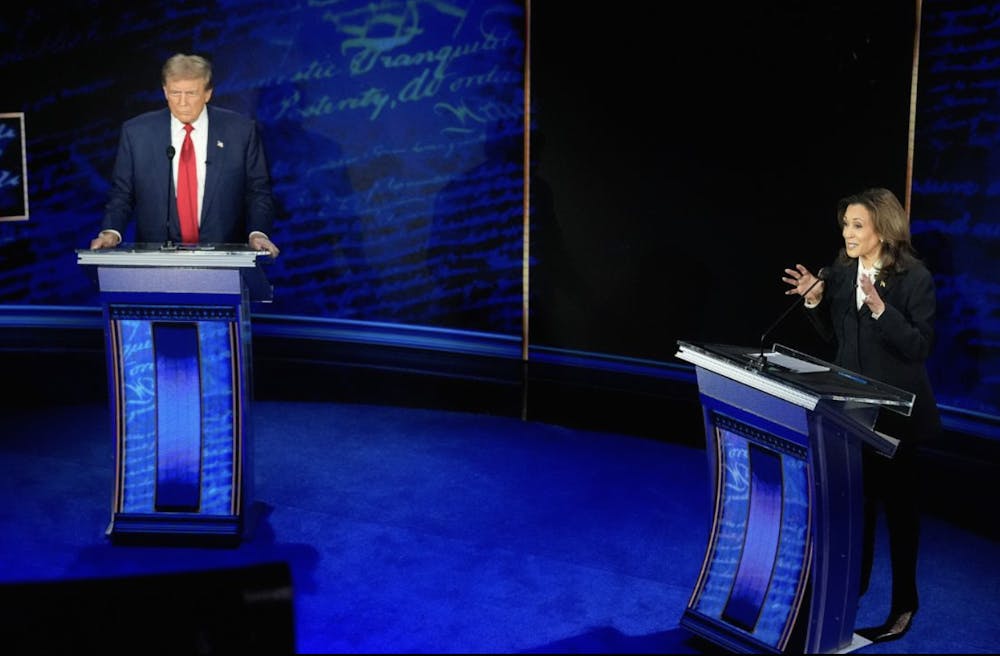Editor’s note: This article will be updated periodically before Election Day as The Chronicle publishes additional Presidential Previews.
The presidential race is heating up in North Carolina, with Democratic nominee Kamala Harris and Republican nominee Donald Trump virtually neck-and-neck in the battleground state as of Oct. 6.
Ahead of Election Day Nov. 5, The Chronicle is compiling its Presidential Previews in one place to keep you informed before you head to the polls.
Read on for a brief summary of the two major candidates’ platforms, and check out the full articles for more in-depth explanations of their stances that draw on both their current agendas and political track records. Third-party candidates are also represented in the full articles.
Abortion
Trump has a somewhat ambiguous political history on the issue, though he now leans toward leaving the decision up to the states. Harris has long been a vocal proponent of protecting abortion access and stands staunchly in favor of codifying the right.
Climate and environment
Climate issues have come to the forefront of political discourse in recent years, especially for young voters. However, the two major candidates offer drastically different policy approaches. Democratic nominee Kamala Harris supports a clean energy transition and strengthening environmental protections, while Republican nominee Donald Trump advocates for rolling back environmental regulation and investing in fossil fuel energy production.
Criminal justice
Trump is continuing to run on a tough-on-crime agenda, while Harris is aiming to strike a balance between emphasizing her experience as a prosecutor and promoting more progressive reforms.
Economy
Trump has long been a proponent of tax cuts and reduced government spending, though the national debt grew nearly $7.8 trillion during his presidency. Harris mostly aligns with President Joe Biden's economic vision of strengthening the middle class and reducing corporate favoritism.
Foreign policy
Trump continues to be skeptical of multilateral alliances and advocates for an “America First” approach to foreign relations. Harris’ stance largely aligns with Biden’s in terms of supporting Ukraine, combatting Chinese aggression and promoting economic development in Africa, though she has been more outspoken than the president about protecting human rights.
Health care
Trump and Harris have both framed their approach to health policy around making care more affordable, though they present distinctly different plans for doing so. Trump has presented few details about his health care platform, though he has walked back his prior calls to repeal the Affordable Care Act — commonly referred to as Obamacare. Meanwhile, Harris promises to lower health care costs through caps on prescription drug costs, insurance premium subsidy expansions and medical debt relief efforts.
Immigration
Trump continues to promote heavily restrictive policies, including building a wall and increasing federal agent presence at the southern border. Harris also advocates for increased border security, though she has been vocal about the need for immigration policy reform.
Israel-Hamas war
Trump displayed allegiance to Israel during his first term, while Harris aligns with Biden on protecting Israel’s right to self-defense and calling for a cease-fire. Though, she has been more outspoken than Biden about the need to address humanitarian suffering in Gaza.
Get The Chronicle straight to your inbox
Sign up for our weekly newsletter. Cancel at any time.
Opioids
Trump and Harris have spent much of their respective political careers working to combat the ongoing opioid crisis. Each supports crackdowns on drug imports and investment in treatment and recovery programs, but Harris has prioritized going after pharmaceutical companies while Trump has targeted foreign suppliers.
Social spending
Harris’ and Trump’s agendas and records on social spending are highly divergent. The Democratic nominee is largely in favor of expanding and enacting new social programs, while the Republican nominee has long been a proponent of cutting welfare funding.
Trade
Trump and Harris both support relatively more protectionist policies than previous presidents, though Trump favors significantly higher tariffs on foreign goods than his Democratic challenger, who has denounced his agenda as a "Trump tax."
Transportation and infrastructure
Trump failed to secure a bipartisan infrastructure bill during his first term and has pledged to cut Biden-era spending. Harris is running on the legislative track record of the Biden administration — most notably the 2021 Infrastructure Investment and Jobs Act — though she historically stands to the left of Biden on energy infrastructure.
Voting rights
Trump supports restrictions he contends will protect election integrity, like voter ID laws and limits on mail-in voting, while Harris has promised to expand access to the ballot box and combat laws she considers restrictive or discriminatory.

